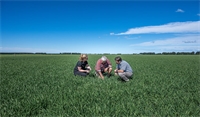Grow more tucker with Mohaka
THIS PROMOTIONAL FEATURE WAS PROVIDED BY AGRICOM
Mohaka AR37 is bringing a new dimension to the hybrid ryegrass category, coupled with the industry’s leading endophytes for insect protection and new high producing genetics. Farmers that are looking to increase ryegrass production over a 2-4 year rotation now have the answer with Mohaka.
Hybrid ryegrasses are currently receiving more interest in areas where persistence from longer term ryegrasses has become challenging. The ability to grow more feed from a hybrid ryegrass over a similar time span is gaining more traction and as a system fit this gives farmers another option when placing a high-quality tetraploid ryegrass with big yield potential into the rotational plan.
Mohaka being a tetraploid, means that it has “four sets of chromosomes per cell”, therefore offering fast establishment speed with high all-year-round seasonal production while also being able to maintain exceptional quality due to tetraploid genetics and offering low aftermath seeding. The new generation breeding of Mohaka is bred from diverse hybrid ryegrass genetics with a proportion of it being a 60-65% long lived hybrid and 35-40% Italian ryegrass genetics. This enables Mohaka to obtain the strong establishment and winter production of an Italian ryegrass, while the long-lived genetics aid in persistence and production during the tougher months of summer and autumn. This is when Mohaka with AR37 endophyte really expresses itself; with added insect protection and increased long term benefits, it is a real asset when added to most farming systems.
Farmers looking to grow high quality finishing and/or milking feed will be well suited to introducing Mohaka to their system. The seasonal growth of Mohaka means farmers can grow more feed in the winter and spring and the late heading date means it will keep producing high quality drymatter. Being quick to establish and with the addition of AR37 endophyte, Mohaka is the ideal fit for extending the life of perennial stands that are opened up due to pasture damage, whether that be from harsh summer conditions or winter pugging damage. The addition of legumes such as Relish red clover and Attribute white clover will help to increase the production and quality of the feed source offered to stock and in return increase production per hectare. The option to also incorporate Ecotain® environmental plantain provides an added environmental boost, with the potential to reduce nitrate leaching from the paddock by up to 60%. Adding legumes and herbs into pasture mixes also contributes to long term resilience.
To get the most out of your paddock of Mohaka, following best practice establishment procedures is important. Allowing glyphosate enough time to work effectively and creating a fine, firm, even seedbed is desirable for roller seeding. However, if looking to direct drill, the most important points are to ensure a good kill at spray out and to not drill the seed too deep, while also drilling with a DAP fertiliser at establishment. Establishment rates of Mohaka will vary with a full sward being sown at 25-30kg/ha depending on the addition of clover and herbs, or undersowing into existing pasture at rates of 15-20kg/ha. Due to the larger size of a tetraploid seed, sowing rates need to be increased to ensure adequate plant numbers are achieved.
Contact Ruralco or your local Agricom Territory Sales Manager for more information.
Related

The start of the year has kept us on our toes, with plenty of rain, but a few good harvest days in b...
Read More

This month we will look at fodder beet crops, crops, autumn sown crops, and grass grub control in pa...
Read More

Arable growers worried that some weeds in their crops may have developed herbicide resistance can no...
Read More

If target yields or production are not being achieved, and the key macronutrients (nitrogen, phospho...
Read More

A new economic report shows New Zealand’s arable industry plays a critical role in supporting lives...
Read More

The end of November, early December has finally brought some settled sunshine across the region, wit...
Read More